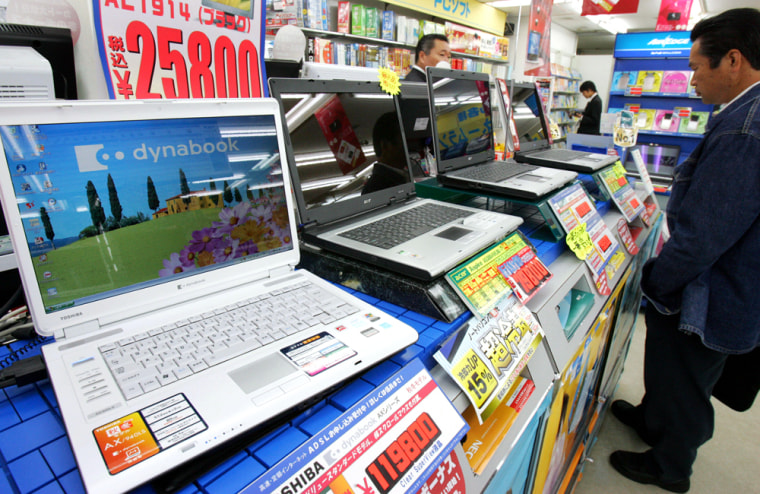Just saying the word “recall” is enough to make a company chief cringe.
Now imagine being Sony chief executive Howard Stringer and saying it more than 9 million times.
Stringer, the Japanese electronics manufacturer’s first foreign chief executive, has his hands full these days with the massive recall of lithium-ion batteries for laptops and with production delays in the company’s much hyped next-generation game console.
Sony Corp. said Thursday that the recall of some 9.6 million batteries, announced in recent weeks by just about every major laptop maker in the world, will cost the company 51 billion yen ($429 million), instead of the earlier estimate at between 20 billion yen ($168 million) and 30 billion yen ($252 million).
Sony acknowledged that the price cuts in Japan for the PlayStation 3 video game console and the production problems for the machine will also chip away at sales and profits at its gaming division.
Although prices on game machines tend to gradually come down, the announcement last month by Sony Computer Entertainment to cut the price of the basic model by about 20 percent to 47,600 yen ($400) was highly unusual in coming even before the machine went on sale. Outside Japan, the prices will remain the same.
“Hopes for the PlayStation 3 have really come down,” said Toshiaki Nishimura, analyst at Yasuda Asset Management Co., adding that the market and game software developers are expecting far more success from the rival offering from Nintendo Co. Wii.
The PlayStation 3 is going on sale in Japan Nov. 11 and Nov. 17 in the U.S. but were delayed until March 2007 in Europe because of the production problems.
In fact, although the company plan to ship 6 million PlayStation 3 machines by March, it will only have 400,000 machines in the United States and 100,000 in Japan for their launches. U.S. retailer GameStop Corp. filled its pre-order slots quickly, in some cases within minutes after they were opened earlier in the month.
Given such problems, Sony now expects group net profit of 80 billion yen ($673 million), down 38 percent from the 130 billion yen ($1.1 billion it had forecast in July for the fiscal year ending March 2007.
Sony left unchanged its fiscal year sales outlook at 8.23 trillion yen ($69 billion) but lowered its operating profit 62 percent to 50 billion yen ($420 million) from the earlier forecast for 130 billion yen ($1.1 billion).
Tatsuya Mizuno, analyst a Fitch Ratings in Tokyo, said Sony may need to further lower its projections as losses related to the battery recall may grow. Toshiba has said it may demand damage compensation from Sony, and others may follow suit.
“The battery problem is not a simple one-time problem for Sony because it hurts the company’s reliability as a supplier in its core electronics sector,” Mizuno said, adding that Sony’s future business could be hurt for some time.
Laptop makers, including Dell Inc. and Apple Computer Inc., have recalled millions of Sony’s lithium-ion batteries in recent weeks. The recalls come after the discovery that the batteries can short-circuit and cause some computers to overheat and even burst into flames.
Sony is joining the recall with its own Vaio laptops and that will also trim earnings for the current fiscal year, Sony said.
Japanese makers Toshiba Corp., Hitachi Ltd., Fujitsu and Sharp Corp. are also recalling laptops using Sony batteries.
Lagging sales and profits for the handheld PlayStation Portable are adding to the woes in Sony’s gaming unit, the company said in a statement.
But Sony said despite such setbacks, it is on its way to a turnaround in its core electronics business because of hit products such as the Bravia liquid-crystal display TVs and digital cameras.
Sony has been struggling to turn around its business after getting beaten by rivals on key consumer electronics products such as digital music players and flat-panel TVs.
It is still behind in portable music players, where the iPod from Apple Computer Inc. commands top market share not only overseas but in Japan.
Sony has regained some market share in flat TVs, however, with products using displays produced in a joint venture with Samsung Electronics Co. of South Korea.
For the fiscal year ended March, Sony marked a 123.6 billion yen profit ($1 billion), down 24.5 percent from 163.8 billion yen in fiscal 2004. Fiscal 2005 sales climbed 4.4 percent to 7.48 trillion yen ($63 billion) from 7.2 trillion yen in fiscal 2004.
Sony shares, which have fallen back after gaining 50 percent earlier this year, slipped 0.4 percent in Tokyo to close at 4,790 yen ($40). The forecast revision was announced just after the market closed.
